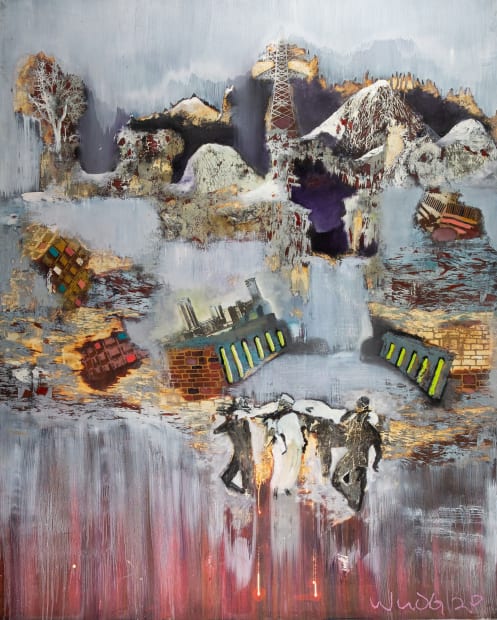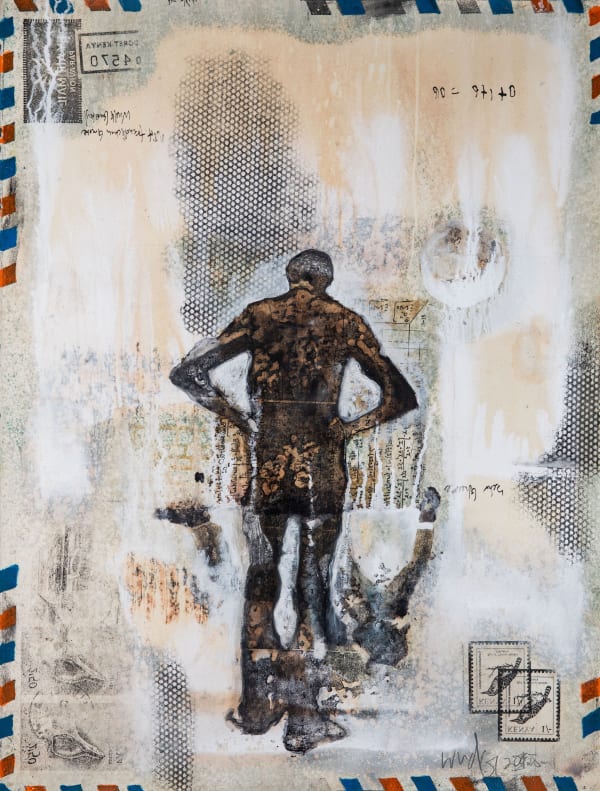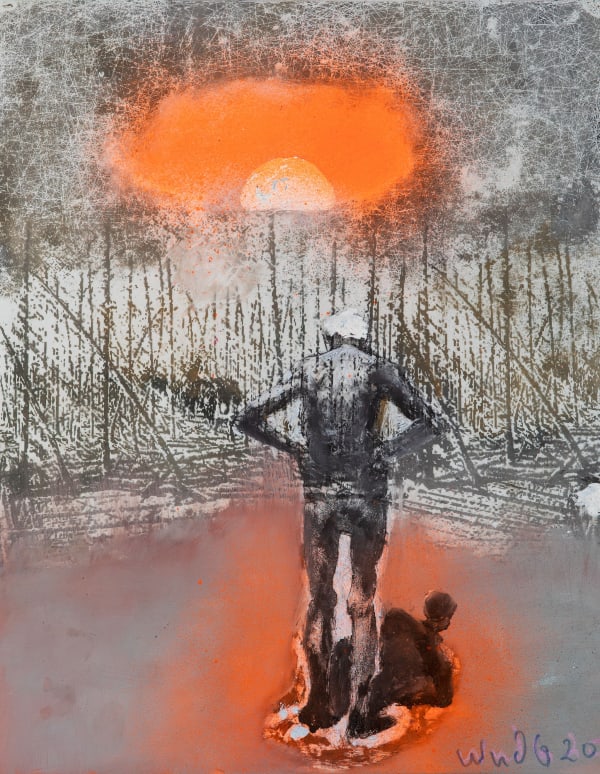-
-
I lay there pondering my situation, lost in the desert, and in danger, naked between sky and sand and stars, withdrawn by too much silence from the poles of my life.
From Wind, Sand, and Stars by Antoine de Saint-Exupéry -

-

-
-
-
What makes this newest body of work so powerful is the coalescence of elements - our aloof egotist, his inhospitable environment, and the invisible ley lines that connect them all together. Our protagonist no longer remains agnostic to what's happening around him, with a crescendo in each piece of Smokey being notably more taken with his environment.
Now, Smokey appears to have transformed from a detached and indomitable character into an evocative persona that personifies how much of the world feels today - isolated, yearning for humanity, unproductive - in a vast barren landscape of uncertainty.
-
In “All Before Me 2,” our gaze falls upon a man staring into the distance - arms upon hips, stripped bare, and lethargic in the face of his reality. Reminiscent of Lucian Freud, Onditi has transformed Smokey from a determined proletariat to mere mortal, exposing his raw state. What becomes painfully clear is that Smokey can no longer remain passive in the face of his environment - that there exists a co-dependency between individual and system, one that plays out in various dramas but remains an ever present reality.
In “Mediterranean Dream,” the unmistakable challenges confronting refugees as they flee their harsh geopolitical circumstances is juxtaposed against the blighted destination and tainted passageway - evoking a plea for commonality and interdependence rather than the pursuit of isolationism.
Onditi’s imaginative world has come full circle, portraying Smokey in a drama of societal and economic ley lines, interconnected systems that beg to be recognized but remain often hidden beneath the surface.
-
-
We are one, after all, you and I, together we suffer, together exist, and forever will recreate each other.
― Teilhard de Chardin -
-
About the Artist
Onditi’s practice challenges our understanding of both our cultural topography and the physical world within which we exist. Addressing universal themes of pollution, climate change, fragmented and unequal societies, and the degradation of our natural planet, Onditi’s practice eschews trendy identity politics to focus on endemic issues affecting all of humanity.
Working on his preferred canvas of digital polyester inkjet plates, Onditi is able to compose intricate and complex masterpieces portraying societal chaos and decay with a variety of oils, caustic acids, prints, and film. Seemingly intricate cityscapes give way to utter desolation, the degeneration aided by vibrant, almost radioactive luminosity suggesting our half-life is imminent. Evolving his historically isolated and anonymized “smokey” character from his previous works, we now experience social movements at scale – with anonymous figures in the plural navigating the treacherous landscape and realizing our co-dependance.
Ultimately, Onditi’s canvases remind the audience of what is at stake. Our collective existence is in the balance, the future malleable, the outcome uncertain.
Born in Kenya in 1980, Paul Onditi moved to Germany in 2000, where he studied art at the Hochschule für Gestaltung in Offenbach am Main. In 2010 he returned to Nairobi, where he is currently living and practicing. Exhibitions include African Metropolis. An Imaginary City, Rome (2018), 1-54 Contemporary African Art Fair, London (2018), Shifting Backgrounds, 50 Golborne, London (2018), Dak’Art Biennale, Senegal (2018), and VOLTA New York (2017).
Past viewing_room
CONTACT
info@montaguecontemporary.com
+19174953865
HOURS
Thursday -- Saturday from 11am - 6pm
Private viewings available by appointment
Facebook, opens in a new tab.
Instagram, opens in a new tab.
Artsy, opens in a new tab.
Join the mailing list
Send an email
Copyright © Montague Contemporary 2025
This website uses cookies
This site uses cookies to help make it more useful to you. Please contact us to find out more about our Cookie Policy.











